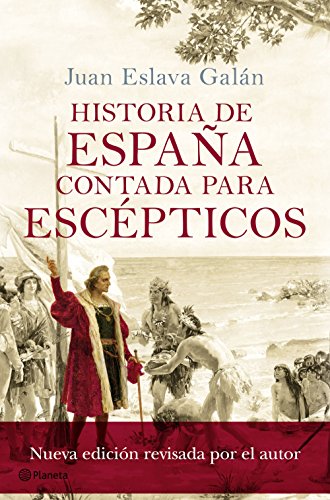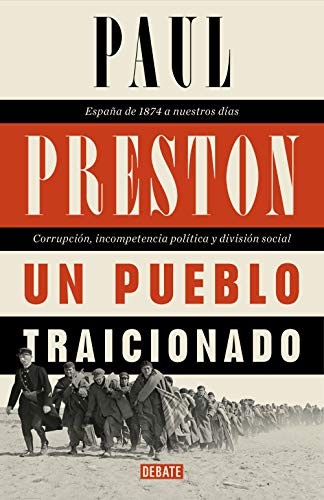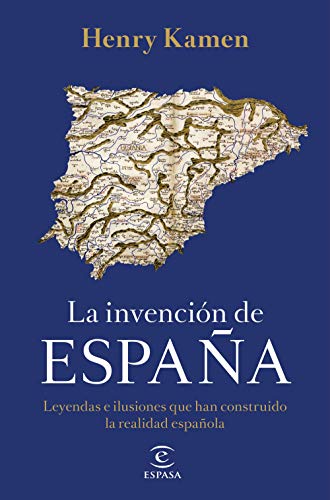Every nation has that diffuse roots as a mixture of peoples on many occasions in conflict. Spain was not going to be an exception and its formation emanates from unsuspected alliances, vagaries of destiny and proximity, especially that closeness that, beyond the delirious wet dreams of interested separatisms, describes in the inhabitants of specific areas of this planet obvious similarities. The mere fact of belonging to an ethnic group, with a territory as common as a peninsula and extended in the mix, cannot establish differentiating elements beyond invented assumptions.
Make literature of this or any other aspect about the history of Spain it has its dangers. Because beyond the historical fictions where everything can be accommodated, history books as informative elements run the risk of becoming political tools. So you have to spin very fine to find those books on the history of Spain that they are based on rigorous documentation and that draw narrative scruples to make the noble task of the historian an interest to make known, always with the capacity to open up to synthetic discoveries and evaluations by comparing different sources.
There are not a few Hispanists beyond our borders who have given themselves to the cause of the story of what is Spanish with that confidence that seems to give historical asepsis, independence of criteria. All these cases are left as hoaxes and make up a mosaic of what is Spanish like a fascinating journey where there is no room for pseudo-progressive complexes or Pharisees capable of even inventing false vestiges to put some part of Spain before it as having greater historical rights ... It's not my thing, you can. watch here as a demonstration of the separatist hordes' ability to falsify everything. An even more sinister case than the delusional Catalan INH ...
Beyond the bloody color of the flag (what if we leave it in red, yellow and red without a shield? A middle ground between those of the tricolor and the monarchists), it is much more interesting to think of a union due to the fact of that closeness of the terroir. Because the separatists of any place live in their reverie, in an Ithaca adrift through the seas of a world that denies them their condition… delusional.
Top 3 best history books of Spain
A history of Spain, by Arturo Pérez Reverte
The sense of being Spanish is today intoxicated by perceptions, ideologies, complexes and a long shadow of suspicion about identity that serves as the cause of the constant controversy around what it means to be Spanish. Labels and Manichaeism weigh down any notion about what is Spanish, in favor of all those who conspire against the mere fact of being, filling it with guilt, approaching it from the interested prism of the moment that recovers dark pasts to take advantage of it.
The hard-working notion that Spain is now the same as when it was occupied and patrimonialized by a faction, supposes an absolute recognition that everything is lost, that those who transformed it under the single prism keep it for themselves in front of those who loved it as something. more plural and diverse. A disservice to a national identity that, like any other, had and has its lights and shadows and that, in the end, should not be of any ideology but of those who inhabit that strange and crowded national bosom.
That is why it never hurts to pay attention to a fundamental chronicler of our days. A writer who deals without fuss about the cause of identity from the anecdotal to the essential. Because this kind of compilation of thoughts dot very different temporal spaces of the Iberian panorama in which rogues, scoundrels, liars, conjurers of the verb and indoctrinators without their own doctrine thrived and thrived, from both sides of the pseudo-ideological range.
And I say "pseudo" putting it before ideology because really, on many occasions it is about that, to undress the lie, to exhibit falsehood, to write with Pérez Reverte's most hurtful stiletto to end up marking each one with their miseries.
The pride of being Spanish or Portuguese or French resides in the brilliance of people still free from the stigma of this behaviorism towards lies. To confront a supposed nationalism, the new offended Spaniards wear the opposite flag, the one that for them does dress truth and purity, the one that never sheltered miscreants when not criminals. As if the bad guys could only be on one side, as if thinking differently from them were plunging into that supposedly black Spain that if it exists is precisely because of the fierce brow in which some only look with yesterday's eyes, and others, as hurtful answer, they are entrusted to the old spirits.
Because it is not the same to repeat the just restoration of rights and honor of the defeated in any war than to try to submerge everything else in ignominy, until the end of days and for everything that moves at the same pace.
La Historia para Pérez Reverte is a space on which to speak freely, without the language constrained by the politically correct, without debts with its possible supporters, without acquired commitments and without intention of writing a new history. History is opinion too, as long as this is not that widespread self-serving falsehood.
Everything is subjective. And that is well known by a writer who necessarily makes empathy a tool of trade. And so we find this book that talks about cruelty when cruelty was law and that opens up to conflict when the clash of ideologies led to the storm.
Spain, sum of nationalities according to who sees it, project by simple territorial connection, homeland by the shared hodgepodge from the Pyrenees to Gibraltar. All to one in the general mess, participating in glorious moments or dark pages, depending on how they want to read.
Pérez Reverte is an expert voice in that of the identities on the hot cloths that are the flags, a story of what this Spain can be in which the best thing, simply, is to consider others as equals and enjoy their things when we travel with that curious camaraderie of a remote raised rag. Little or nothing else is Spain, not even a threatening letter for the anthem. A Royal March that even its origins are lost in a heterogeneous creative imputation.
History of Spain told for skeptics, by slav galán
It happens as with everything. Once an art or subject has been mastered, one can afford to indulge in the details, to change the usual rhythm with which things are presented. And you can even present your opinion on the matter as long as that interpretive aspect is manifested. Because yes, in history there are also gaps and there are spaces where the assumption complements what the strictly historical does not reach.
There are those who cover it by reinventing history and those who do so by making assumptions for each one to value. Obvious differences between unhealthy indoctrination for whatever cause, in our case separatism, and a proposal for investigation or analysis in the case of a more open mind ...
From prehistory to Podemos, the author reviews the history of our country telling it in an original and entertaining way that will hook readers. This is a history of Spain that, as the author himself tells us, does not pretend to be truthful, fair and dispassionate, because no history is. It is not made to flatter kings and rulers, nor does it intend to flatter the bankers, or the Episcopal Conference, or the gay community, or the philatelic, or the unions.
This is a work that manages to teach, inform and entertain in equal parts, written with the unmistakable informative style of Eslava Galán, where the story of the great events is added to that of the most curious and unknown anecdotes of the protagonists of our history. For everything, a work not to be missed.
A people betrayed, by Paul preston
Given the detail of the different eras of Spain, Paul Preston takes the cake in that tinderbox that was the twentieth century for a Spain that tried to grasp roots between betrayals, rudeness and powerful hatred, perhaps born from the colonial disasters of the previous century and growing among their misery.
When Lazarillo de Tormes was written, the idiosyncrasy of Spanish growth, that mixture between the survival instinct and the aspirations of every botarate involved in regidor or politician, had just been sentenced for posterity.
It is not that they were all who were, but among all those who reached power, many of those characters of the guide, recovered for the cause many centuries later with the absurdity of Inclán Valley. An astute observer and highly skilled chronicler like Paul Preston would surely marvel at the deprivation of success of so many ingenious guide-guides in favor of sycophantic chumps who almost always, as in the blackest novels, end up triumphing.
In the extensive bibliography of this English writer, this volume serves as a synthesis or at least as a compilation of relevant intrahistories for an entire XNUMXth century marked to a large extent by dictatorship or corruption and despite this also surpassed in the most remote scenarios of the scene. politics, in the hands of inept on many occasions. Although in the end it follows that it was not simple ineptitude but servility to the elites with which both parties perpetuated themselves in a desperate quid pro quo.
That is the great betrayal, the maintenance of the favors given as a fixed guideline, a devastating custom that turns politicians more than hypocrites into cynics who never looked at social needs beyond the minimum base always conquered by the popular classes. But of course, all this is my own deduction from a more aseptic story that focuses on the facts so that it is the reader who ends up judging and submitting to criticism.
Other interesting books on the history of Spain ...
The Invention of Spain, by Henry Kamen
I love this title because yes, we must recognize that Spain is an invention, a construct. In the same way that Germany or China is. Because there is only the old pangea spread between the seas at the whim of the tectonic plates. The question is the will to want to belong, to inhabit the same land or to engage in dreams of superiority under the cover of economic prosperity achieved on many occasions from the privilege of blackmail exclusively taken advantage of by separatisms, by no one else.
Nations are not born: they evolve and are created, they arise from struggles and hopes and persist thanks to the courage of their people. In a very real sense, they are "manufactured", and not because they are inspired by falsehood, but because they aspire to the truth, since there have always been alternative and conflicting views that have contributed to creating a country. This book is an analysis of some of those alternative views that over time have helped shape our perception of Spain. Visions often inspired by ideologies and the distortions that may accompany them, which need to be understood and explained, rather than rejected.





1 comment on «The 3 best history books in Spain»